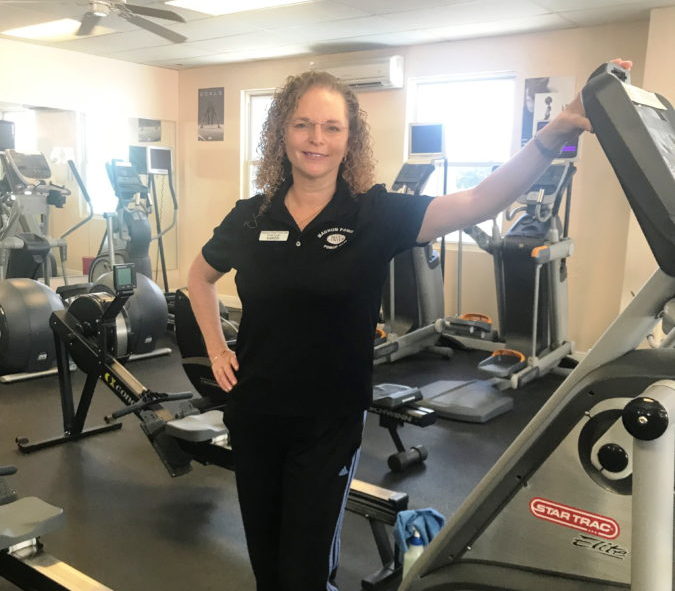When you’ve spent 25 years watching people change their lives through diet and exercise it no longer becomes just a job, it becomes a passion.
For Karen Hodgkins, the current epidemic of obesity, diabetes and heart disease in the community has given her even more reason to keep pushing the healthy lifestyle to as many people she can reach. Whether it’s through Magnum Power Force Gym or teaching people how to make healthy choices through the Diet Center weight loss program she runs through the gym.
Over the past few months, upgrades have been ongoing at the gym – new cardio machines, weights and the introduction of virtual classes, as well as renovating parts of the building to make way for a functional fitness space.
“The new virtual classes are basically on-demand classes on a big screen taught by the best professional fitness instructors in the world through a programme called Les Mills,” said Ms Hodgkins. “While we still will have our classes with a ‘live’ instructor, this gives the flexibility where if one of our classes is cancelled or if you want to do a class at a specific time and the studio is not being used that can be arranged. It allows there to be a lot more choices in classes, and it also is great for people who might feel a little bit self-conscious about doing classes with other people they can do a class by themselves or bring a friend.”
Virtual classes include Les Mills Body Pump, Grit Series, RPM and Body Flow – a yoga-based class.
The next phase of the upgrades will be making the gym 24-hour access, with plans for it all to be in place by the end of the month.
Making the gym a welcoming and accessible space is part of a mission to get the island healthy.
“My biggest passion is counseling people in weight loss and changing their health, their life and their bodies to become healthier people,” said Ms Hodgkins, who also runs the Diet Centre, whose participants also have access to the gym.
“I have clients who come in with huge health problems. They’re on the borderline of diabetes, high blood pressure, and their doctor is recommending them to take high blood pressure pills, but all of those things can be reversed. I’ve seen people lose the weight by changing their eating habits and starting to exercise, they go back to their doctor, and they can come off their pills and their blood sugar medicine – they are reversing their health. We teach people how to make better food choices and make it part of their lifestyle.”
Ms Hodgkins said weight loss is as simple as changing eating habits and starting an exercise programme – even if that’s just getting out and walking for 20-30 minutes a day.
“It doesn’t take a lot. You just have to eat healthily and get into exercise. Just go out and start walking every day. Just start that. It doesn’t have to be in a gym; it can be anywhere – just get physically active.”
And it isn’t as expensive as people might think to eat healthily, either, she said. “It’s about the choices we make at the grocery store. Some of our fresh fruits and vegetables are expensive, but you have frozen options that you can use that are just as good. Is it expensive the choices you have to make to avoid kidney failure or having body parts removed? What is it worth? It’s all about priorities and our health.”
Ms Hodgkins said she welcomes the introduction of a sugar tax – something she has advocated for over the years. But for the sugar tax to have any effect, she said she hopes to see the money from the tax put towards subsidizing healthcare and educating the public about making healthy choices.
“I am very concerned about the figures of diabetes in this country. What is it doing to our children and what is that doing for the healthcare costs to everyone else that is healthy and that has to pay these premiums in healthcare because of the bad choices that some people in our community are making?”
She said many people still don’t realize that sugar is equivalent to a drug and as addictive as cocaine.
“If you’re choosing to make bad choices then you’re going to have to pay higher taxes on it,” she said. “It may not deter people from making bad choices, but it may help us to help subsidise the healthcare system. People make the choices to eat bad foods, and they know they are making a bad choice, but it’s all about taking care of yourself and making a choice to not end up with the same diseases as your parents had.”
Education in the schools about the benefits of healthy food choices needs to continue, she said, but with more emphasis on the diseases that can contribute to health complications, such as loss of limbs.
“It starts with education in the schools because a lot of obesity is hereditary in the sense that these food habits are passed down from generation to generation. Diabetes runs in my family and I will never forget when I went to visit my uncle, who had diabetes, and I asked him why he was missing a finger, and he said it was because he had diabetes and he had to have it removed. That has always stuck with me, and I knew that I never in my life wanted to lose a body part because of a disease.”
Want more!? Check out Catherine Burns’ tips on eating clean

